A $57 billion trend

Mirae Asset Management
The COVID-19 outbreak at the beginning of this year was unexpected, yet the opportunity it has brought to the cloud computing industry is also unprecedented.
The pandemic has battered many sectors as people were unable to go to work due to lockdowns and social distancing. As a result, most of the activities have been switched to online platforms, which makes end-user demand for cloud-based technology stronger than ever before. People work remotely from home; students communicate with each other and teachers in online classrooms, while shopping and entertaining can also be simply done by a few clicks of a mouse.
The key technology that makes this possible is cloud computing, which means the delivery of computing services, including servers, storage, databases, networking, software, analytics, and intelligence, over the Internet, or the cloud, to offer faster innovation, flexible resources, and economies of scale. Cloud computing provides the scalable resources to gather, analyse, and store all kinds of data for a variety of advanced applications.
The COVID-19 pandemic has no doubt accelerated the adoption of cloud computing in China, where penetration of cloud-based technology remains quite low for the time being.
The pandemic will hopefully die down in the coming months or year, but the impact on the structural shifts in the use of technology as well as working and living styles will be long-lasting.
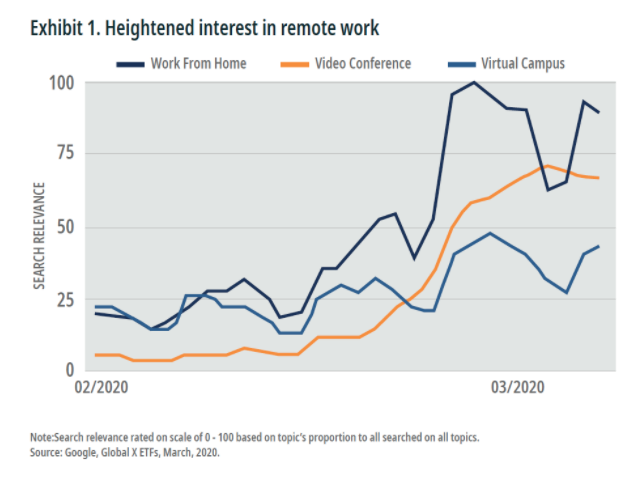
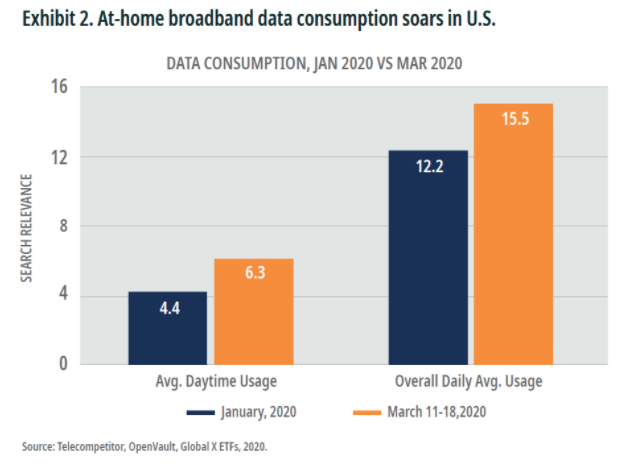
From offline to online
Hit by the COVID-19 pandemic, many offline activities have been quickly shifting to online, making it much easier for online service providers to attract users.
According to Bank of America, it took airlines 64 years to reach 50 million users, Netflix 7 years, but Disney+ achieved this in just five months with the kids under lockdown.
As of mid-April, 1.5 billion children and youth were affected by school closures in 195 countries, from pre-primary to higher education, data from the United Nations Educational, Scientific, and Cultural Organization (UNESCO) show.
Many online after school tutoring (AST) players in China have been offering free online teaching to students since the COVID-19 outbreak, which in a way helps them to extend their reach significantly. This is especially effective in lower-tier cities that were once difficult to penetrate due to higher traffic acquisition costs and competition from local low-cost players.
Some cloud companies also opened up their platforms earlier this year to allow new and existing customers to use their resources for free and thus helped them maintain operations that were hit by the pandemic. The awareness of cloud technology has been increasing among Chinese companies, which begin to adopt cloud technologies more frequently as they restart operations and hire new employees.
Fundamental change
Most individuals and companies are expected to return to previous ways of working, studying, or shopping once the lockdown measures are lifted. However, some fundamental changes have already taken place since a large number of people who have experienced doing it online may find it attractive and thus seek more such opportunities in the future.
For example, companies forced to rely on the remote office during the pandemic may reconsider the necessity of long-haul business trips, which may otherwise be replaced by much cheaper and efficient video conferencing. Consumers that get used to shopping on the Internet may also not visit the brick-and-mortar shopping malls as frequently as before.
A research house recently delivered its latest after school tutoring (AST) mobile app tracker as of April 19.1 It shows that though weekly active users (WAU) of major online big-class AST apps retracted from peak levels in early March, they still recorded strong 92% YTD growth, implying 31% overall retention, which should exceed market expectations.
A recent survey among its fundamental analysts also suggests that 56% of them believe work-from-home technologies will have a lasting impact and continue to be used after the COVID-19 crisis.2 75% of them believe Big Data & AI will be the most important technology for their sector post-coronavirus, followed by cloud computing (48%) and 5G (27%).
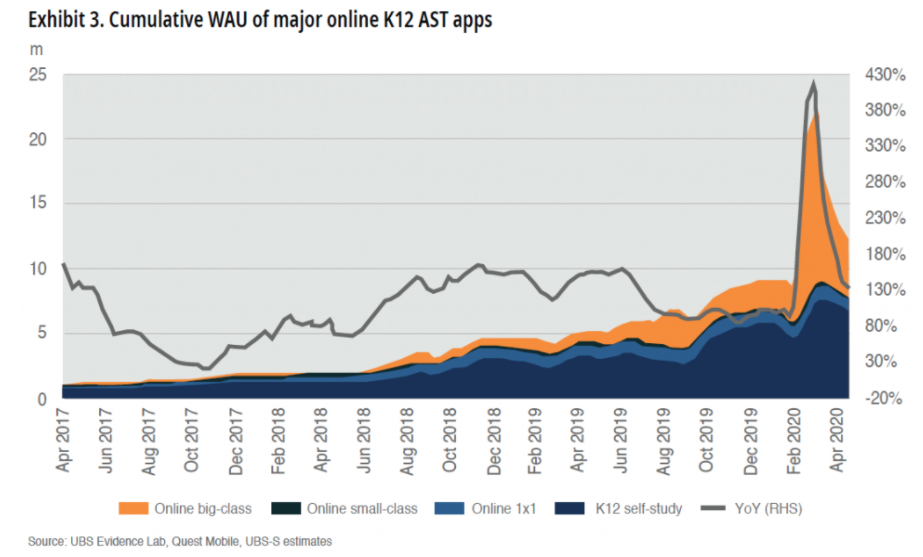
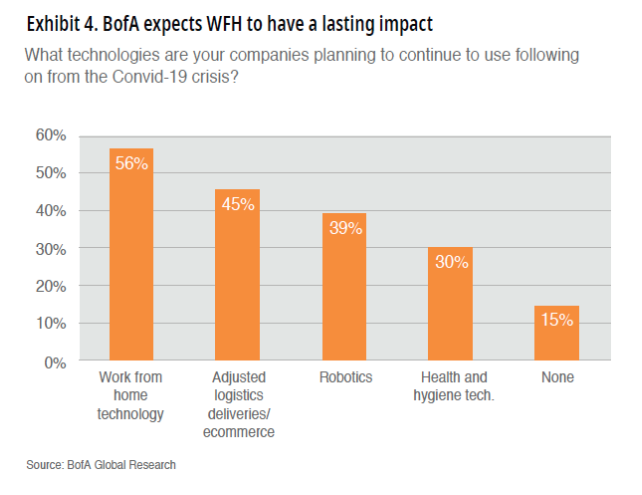
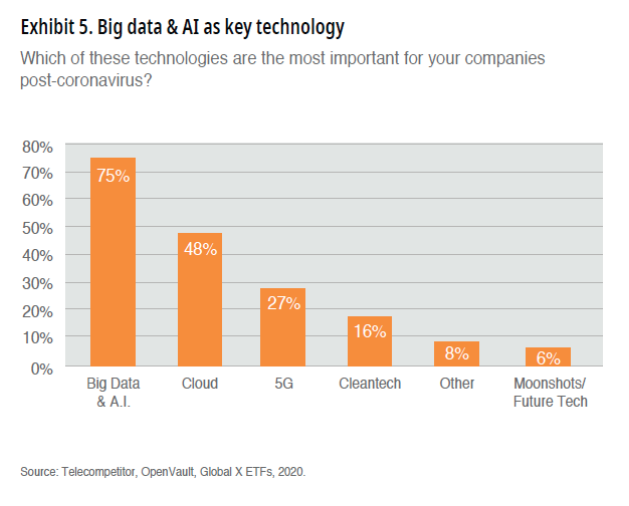
Status quo
China is still in the early stages of developing the cloud computing industry, which remains heavily under-penetrated compared with the U.S. The market size of the public cloud in China is only 2-3% that of the U.S., and the public cloud adoption ratio in China is only 8%, according to data from IDC.
In terms of Information Technology (IT) spending, data from Gartner and Morgan Stanley show that the U.S. enterprises’ expenditure was 5.6x that of Chinese enterprises’ in 2019, though the Gross Domestic Product (GDP) of U.S. was just 1.5x that of China’s in 2019.
Low penetration rate suggests that there’s huge growth potential going forward as China tries to catch up and make its cloud computing industry on par with its status as the world’s second-largest economy. China’s domestic market is more favourable to its own brands, which have a deeper understanding and faster response to clients’ requirements. Local Software-as-a-Service (SAAS) companies are also more nimbly able to customise their software to cater to local regulations and changes in regulation.
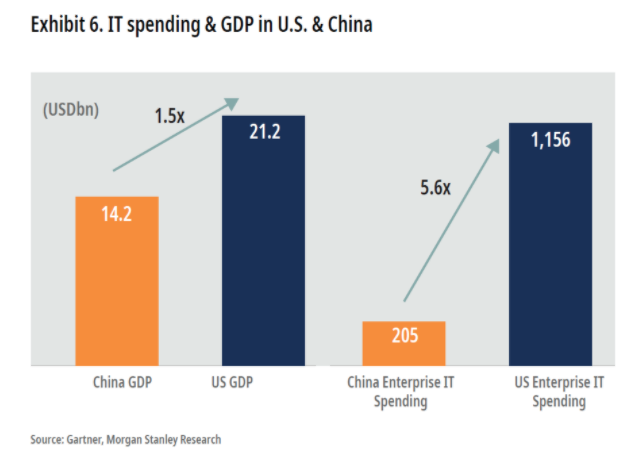
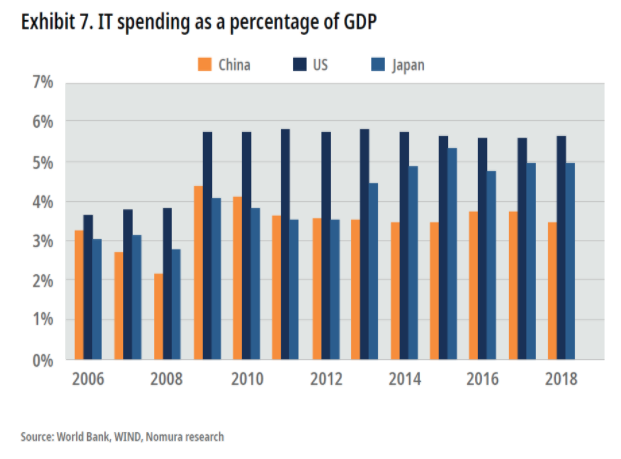
Growth potential
Cloud infrastructure has been expanding quickly during most of the last decade globally. China’s cloud CAPEX is likely to become a crucial growth driver as the country accelerates its construction of data centres under the “new infrastructure” project, which aims to offset the impact from the COVID-19 pandemic and explore the long term growth engine for its economy.
It is expected China’s IT spending to outgrow the U.S.’s in the next three years, and the overall investment in the next ten years could trend up to $57 billion annually in China, up from $41 billion in the past three years.3
Apart from government support, there are strong and enthusiastic market leaders with deep pockets in China that are willing to invest heavily in cloud computing since Chinese enterprises are in desperate need of cloud services to prioritise enterprise resiliency and resource flexibility. Once a company’s IT resources have been moved to the cloud, there will be a growing universe of big data and artificial intelligence tools that can help enterprises further develop their commercial strategies.
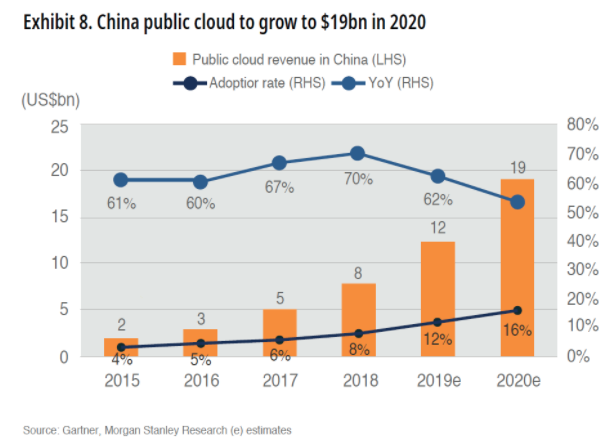
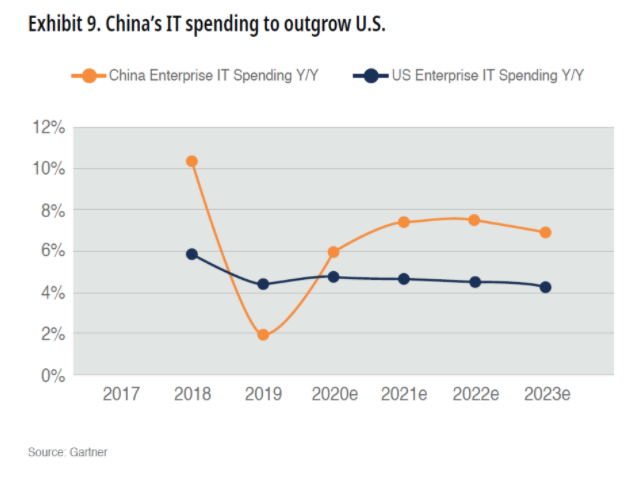
A new era of growth
The emergence of the Asian consumer fundamentally alters the world’s order, offers long-term investment opportunity, and dominates economic themes for the next several decades. Click the 'FOLLOW' button below to hear more of our insights.
Footnotes
1 UBS Evidence Lab, as of 30 April 2020.2 Bank of America, as of 30 April 2020.
3 Morgan Stanley, as of 30 April 2020.
3 topics

It's an exciting time to invest in Asia. Over the last 14 years, I've experienced first hand the growth and evolution of equity markets across the region. We're seeing a shift in global production and consumption. In Asia, Consumption Growth...
